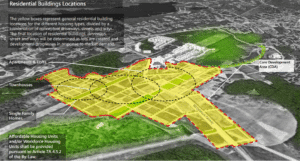The Southfield Redevelopment Authority supported changes that would give the new master development team flexibility to build more housing depending upon market conditions.
New England Development and Brookfield Properties are seeking the changes to jumpstart activity on the 1,450-acre former South Weymouth Naval Air Station property.
“This is the first step in a thorough process in which we will be working closely with town officials in Weymouth, Rockland and Abington,” New England Development Vice Chairman John Twohig said in a statement.
The revised zoning would retain the current maximum buildouts of 8 million square feet of commercial space and 3,855 residential units, for a total of 13 million square feet of development.
But it would give the new master developers the option of shifting the commercial-residential mix, depending upon market conditions. The document cites an example in which a 1.3 million-square-foot decrease in commercial development would give developers the right to build an additional 1,000 housing units.
The new mixed-use development district, or “MUDD,” would only apply to the undeveloped sections of the property.
“The MUDD provisions are intended to promote creative, efficient and appropriate solutions for the development of complex sites” and encourage complementary land uses,” Twohig wrote in a letter to the SRA on March 7.
Approximately 1,275 housing units have been developed at Southfield since 2011, but commercial development has been virtually non-existent since the naval air base closed in 1995. The bulk of the development sites are on the Weymouth section of the property.
The only potential major commercial tenant, Dutch robotics firm Prodrive Technologies, dropped plans for a 300,000-square-foot headquarters in 2019 as the previous master developer faced removal from its role.
The base contains approximately 335 acres of developable land, according to a fiscal analysis submitted to the SRA on March 3 by consultants RKG Assoc.
A predominantly-residential development would provide the greatest fiscal benefits to the communities, the RKG report said, with annual net revenues of $12.6 million in Weymouth, $5.4 million in Abington and $5.5 million in Rockland. The property currently contributes a combined $5.3 million in property taxes, according to RKG.
The Southfield Redevelopment Authority voted to support the proposal last week. Changes to the redevelopment plan also require approval of the legislative bodies in all three towns.
An additional public meeting will be held by the Southfield Redevelopment Authority on March 29, Land Use Administrator Jim Young said. The next steps will be reviews by the Weymouth Planning Board and Town Council, and potential votes by Abington and Rockland town meetings this fall.
The New England Development/Brookfield team won the nod from base overseers to take over the project in 2019. In a presentation, developers said the 8 million-square-foot commercial zoning portion was not feasible because of insufficient demand.
In the latest submission, developers said they will seek to source an interim water supply from the town of Weymouth or the Abington-Rockland Joint Water Works system. The long-term plan would tap into Weymouth’s system if the town joins the MWRA pipeline network, a plan floated by Weymouth Mayor Robert Hedlund in 2021.
Failure to secure a long-term water source led to the removal of the previous master developer, LStar Communities.
The Southfield Redevelopment Authority removed LStar as master developer in 2019, after Hedlund refused to provide municipal water for future development. Hedlund cited a legal dispute between then-LStar executives and its former CEO.
In 2021, a Superior Court judge ordered LStar to pay the redevelopment authority $36 million for its unpaid share of predevelopment and infrastructure costs.









